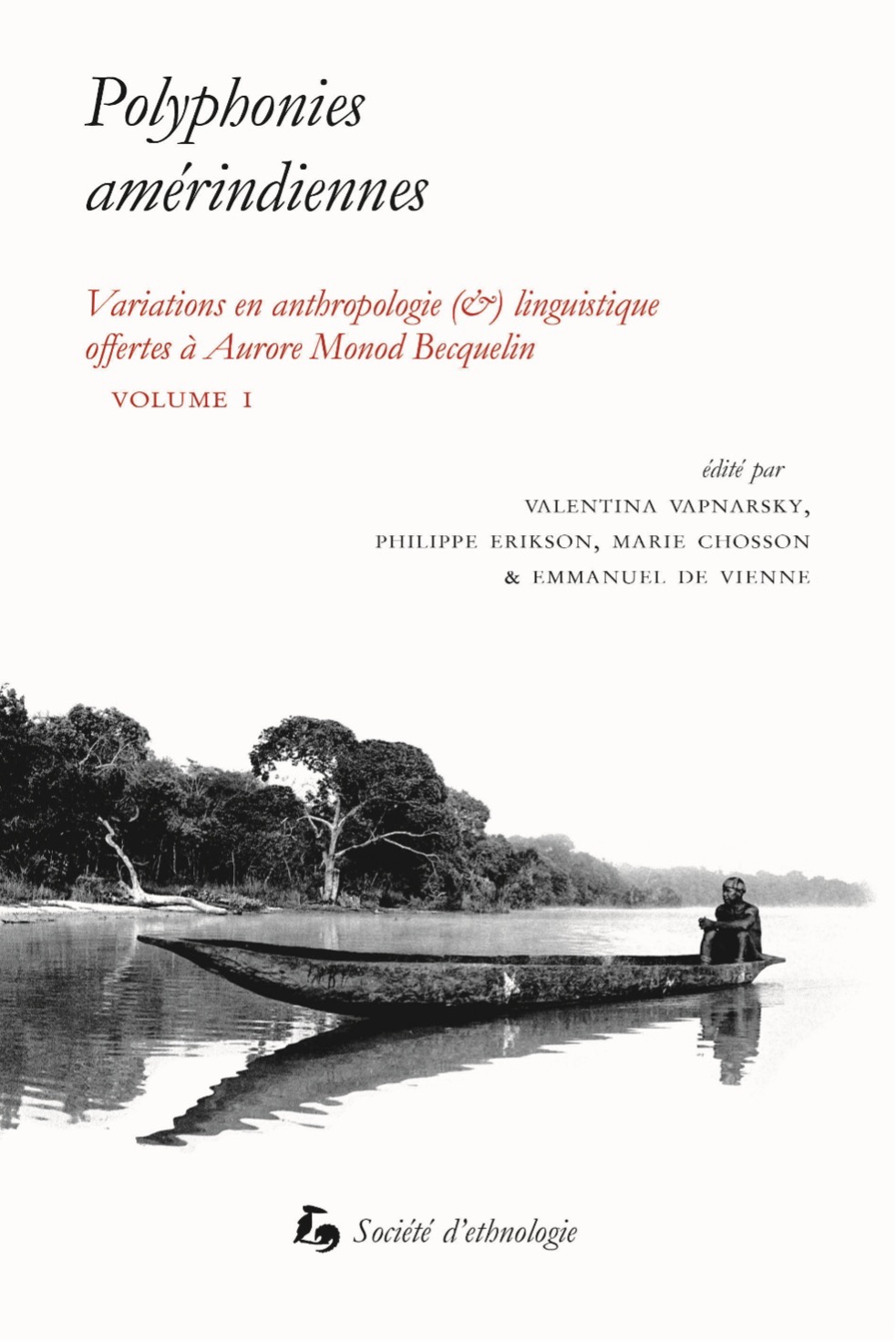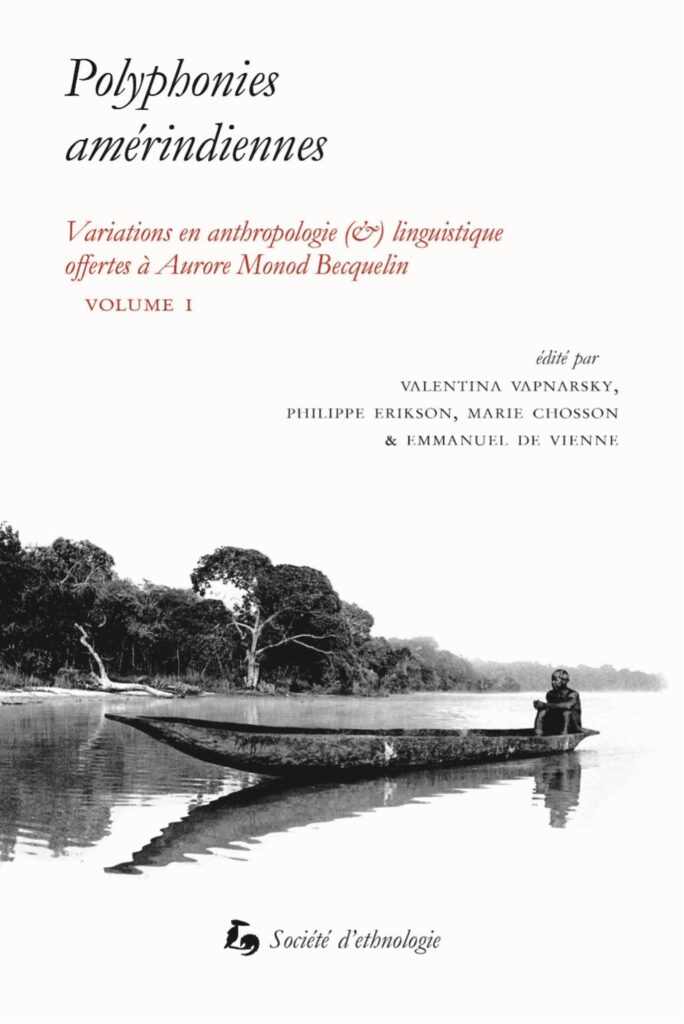
Polyphonies amérindiennes (vol 1), ed. by V. Vapnarsky, P. Erikson, M Chosson & E. de Vienne (2025)
Polyphonies amérindiennes
Variations en anthropologie (&) linguistique offertes à Aurore Monod Becquelin (Volume 1)
Edited by Valentina Vapnarsky, Philippe Erikson, Marie Chosson & Emmanuel de Vienne
Société d’ethnologie, Nanterre, 2025
Amerindian languages and discourses are the main focus of Polyphonies amérindiennes, with leading specialists in the Amazonian and Mayan worlds tackling key themes in linguistic anthropology, from poetics to pragmatics.
The book brings together a collection of works devoted to the discourses and languages of Amazonia and the Mayan world, written by internationally renowned specialists. The analyses address key themes in linguistic anthropology, based on case studies drawn from fieldwork and archives. Structural aspects of certain Amerindian languages–such as space, time and agency–are examined from a discursive and pragmatic perspective. Various oral forms, in particular those of ritual, mythical or conversational registers, are studied both for their poetic qualities and for their specific modes of meaning and efficacy. The enunciative polyphony and intertextuality of these words are highlighted, as are the uses of vocality, gestuality and other co-expressive modes of communication. The book highlights spoken words studied in their original language and, from both a contemporary and historical reflexive perspective, questions the disclosures and effects produced by the translation of languages so far removed from our own. The book is dedicated to Aurore Monod Becquelin, an Americanist and linguistic anthropologist whose essential contributions to the various fields covered are a source of inspiration for the authors. The introduction and final chapter offer an unprecedented historical overview of this researcher’s career and of the field of study she has helped to found and develop in France, in constant dialogue, for over fifty years, with her fields and colleagues from near and far.
Available at: https://www.lcdpu.fr/books/7A2D1586-2AE3-417B-AB16-1A0A120575D8 (2 volumes, 746 pages, 38 €; each volume may be bought separately for 21€/vol.). See volume 2 here: https://salsa-tipiti.org/new-books-by-salsa-members/oree-du-jour-lisieres-de-la-nuit/
[Español]
Polyphonies amérindiennes trata de los discursos y las lenguas amerindias. Especialistas reconocidos de los mundos amazónicos y mayas los abordan a partir de temáticas centrales de la antropología lingüística, desde la poética hasta la pragmática.
La obra reúne un conjunto de trabajos dedicados a los discursos y las lenguas de la Amazonía y del mundo maya, redactados por especialistas de renombre internacional. Los análisis abordan temas centrales de la antropología lingüística, a partir de estudios de caso basados en investigaciones de campo o archivísticas. Se examinan aspectos estructurales de determinadas lenguas amerindias —en particular en lo que respecta al espacio, al tiempo o a la agentividad— desde un enfoque discursivo y pragmático. Diversas formas orales, en especial las de registros rituales, pero también míticos o conversacionales, son estudiadas tanto por sus cualidades poéticas como por sus modos específicos de significación y eficacia. Se pone de relieve la polifonía enunciativa y la intertextualidad de estas palabras, así como los usos de la vocalidad, la gestualidad y otros modos co-expresivos de comunicación. El libro pone en valor los discursos analizados en su lengua original e interroga, desde una perspectiva reflexiva tanto contemporánea como histórica, las revelaciones y efectos que produce la traducción de lenguas tan alejadas. La obra está dedicada a Aurore Monod Becquelin, americanista y etnolingüista cuyas contribuciones esenciales a los diversos ámbitos tratados constituyen una fuente de inspiración para los autores. La introducción y el capítulo final ofrecen una presentación histórica inédita del recorrido de esta investigadora y del campo de estudios que ha contribuido ampliamente a fundar y dinamizar en Francia, desde hace más de cincuenta años, en diálogo constante con sus terrenos y colegas, tanto cercanos como lejanos.
Disponible en: https://www.lcdpu.fr/books/7A2D1586-2AE3-417B-AB16-1A0A120575D8 (2 volúmenes, 746 pages, 38 €; cada volumen puede ser comprado por separado poor 21€/vol.). Ver el volumen 2 aquí: https://salsa-tipiti.org/new-books-by-salsa-members/oree-du-jour-lisieres-de-la-nuit/
Contents Volume 1 (Polyphonies amérindiennes)
- Valentina Vapnarsky, Philippe Erikson, Marie Chosson et Emmanuel de Vienne, « Dans les pas d’Aurore » (p. 11)
- Bibliographie d’Aurore Monod Becquelin (p. 41)
- (Prélude) Valère Novarina, « Quatre cent vingt-huit temps » (p. 53)
Première partie : Amazonie
- Emmanuel de Vienne, « L’aurore vient à nous vers le fleuve. Note sur les auxiliaires directionnels Trumai » (p. 59)
- Francesc Queixalos, « Un applicatif nominal » (p. 71)
- Anne-Christine Taylor, « “Une brève histoire des Hommes”. Petit exercice de traduction » (p. 79)
- Philippe Erikson, « Jeunes pousses et âges de la vie chez les Matis (Amazonas, Brésil). Escapades lexicographiques en terres amérindiennes » (p. 95)
- Bruna Franchetto, « Femmes en métamorphose » (p. 111)
- Vincent Hirtzel, « Passions contrariées. Récits de femmes rebelles du Haut Xingu aux Guyanes » (p. 147)
Deuxième partie : Mayas
- William Hanks, « Sáantiguar: The first six breaths » (p. 181)
- Valentina Vapnarsky, En cet instant… les “maintenant” du maya yucatèque. Multidimensionalité et sociocentricité de la deixis temporelle » (p. 205)
- John B. Haviland, « “Nojon beel xal, xk’oon lok’el ts’in at’ele” (Me voy satisfecho, así llego bien al trabajo): multimodal polyphonies, phatic communion, and metaconversation in a Tseltal encounter » (p. 247)
- Olivier Le Guen, « Intertextualidad y variaciones en la tradición oral maya yucateca de Campeche. Análisis del canto “¡Ay Dios Juanita!” » (p. 275)
- Helios Figuerola, « De la disputa del brujo y el terapeuta por controlar la vida de la parturienta y su hijo entre los tseltal de San Juan Evangelista Kankuk’, en las Altas Tierras de Chiapas » (p. 321)
- Marie Chosson, « Trouver le ton juste pour sauver les âmes tseltal. La difficile mission de conjuguer deux traditions oratoires dans l’élaboration des sermons coloniaux » (p. 351)
- Mario Humberto Ruz, « Una distinta aurora: la nobleza maya colonial » (p. 377)
- Margarita Valdovinos, « La consolidación de los estudios mayistas en Francia » (p. 407).
About the editors
A specialist in linguistic anthropology, Valentina Vapnarsky is Research Director at the CNRS and Director of Studies at the École Pratique des Hautes Études. Since 1991, she has conducted long-term fieldwork among the Itza Maya in Guatemala and the Yucatec Maya in Mexico.
A specialist in Amazonian ethnology, Philippe Erikson is Professor at Paris Nanterre University and currently Editor-in-Chief of the Journal de la Société des américanistes. Over the past forty years, he has spent extended periods with the Matis (Amazonas State, Brazil) and the Chacobo (Beni Department, Bolivia).
An anthropologist conducting research since 2007 among the Tseltal Maya of Chiapas (Mexico), Marie Chosson is Assistant Professor at Inalco, where she is in charge of the Mesoamerican Languages and Civilizations program and director of the “Amériques” series published by Presses de l’Inalco.
A specialist in Amazonian ethnology, Emmanuel de Vienne is Assistant Professor at Paris Nanterre University and currently President of the association Terrain, which publishes the Journal of the same name. Since 2003, his research has focused on the Trumai of Mato Grosso (Brazil).


